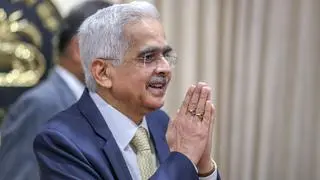When RBI Deputy Governor Viral Acharya cautioned in October 2018 that governments that do not respect the central bank’s independence will sooner or later incur the wrath of financial markets, ignite economic fire, and come to rue the day they undermined an important regulatory institution, the die was probably cast for the premature exit of his boss Urjit Patel in December 2018, followed by his own resignation six months later.
Acharya, who is a key member of the rate-setting Monetary Policy Committee (MPC), has put in his papers six months ahead of the completion of his three-year tenure. The Reserve Bank of India, in a statement, on Monday, said: “A few weeks ago, Acharya submitted a letter to the RBI informing that due to unavoidable personal circumstances, he is unable to continue his term as a Deputy Governor of the RBI beyond July 23. Consequential action arising from his letter is under consideration of the Competent Authority.”
A replacement
The NDA government will now have to quickly find a replacement for Acharya, just as it did in the case of Patel.
Before joining the RBI as its youngest Deputy Governor at 42, Acharya was the CV Starr Professor of Economics, Department of Finance, New York University – Stern School of Business. He has been on leave from the university since January 17, 2017, and is likely to join back.
Under Patel, who was reticent, Acharya became the public face of the RBI, communicating its stand on a host of issues, including growth, inflation, fiscal consolidation, stressed assets, public credit registry, and prompt corrective action.
Acharya brought a contrarian view to the table during MPC meetings. At the April and February 2019 MPC meetings, he, along with Chetan Ghate, Professor, Indian Statistical Institute, said no to a rate cut, while the remaining four members voted for a rate cut.
Madan Sabnavis, Chief Economist, CARE Ratings, said: “Acharya was an important part of the MPC. In the MPC, we have seen that he generally tended to be a contrarian. He has been very proactive and quite vocal in his views. It is always good to have dissenters in the MPC. There is no reason why everybody should have the same view.”
Interesting analogies
The Deputy Governor usually weaved in quotable quotes from classics or had analogies from cricket to liven up his MPC statements.
Sample this: In his last MPC statement, Acharya quoted: “Why do old men wake up so early? Is it to have one longer day?” wonders Santiago, the old fisherman from Ernest Hemingway’s Old Man and the Sea . “I found myself preparing and writing these minutes early, too, perhaps so I could have one longer drafting day,” he added.
In his February 2019 MPC statement, he came up with a cricket analogy: “While paying attention to growth, I prefer to “take off the helmet” but “stay within the crease”.
When Shaktikanta Das, Governor, RBI, was asked about the rumoured resignation of Acharya in December 2018, he told the media that he just had tea with the Deputy Governor and that he was still with the central bank.
“I have a feeling that he wanted to leave. The timing of his exit should be seen in the context of the ‘fall’ term in US universities beginning in August. With his term anyway coming to an end in December 2019, he would have thought of quitting before his term ends. If he had continued for another six months and the extension at the RBI did not materialise in December, then he would have had to wait for another four-five months before joining back academia. I think, this is what might have prompted him to resign. The government may prefer to have a non-NRI economist as Deputy Governor.”
Since Acharya submitted his resignation a few weeks ago and the Finance Ministry has so far not called for applications from suitable candidates to fill the position, the likelihood of an internal RBI candidate, possibly MD Patra (Executive Director, who is also a member of the MPC), taking the position has increased, say RBI insiders.
Of the four RBI Deputy Governors, two are internal candidates and two external (an economist and a commercial banker).






Comments
Comments have to be in English, and in full sentences. They cannot be abusive or personal. Please abide by our community guidelines for posting your comments.
We have migrated to a new commenting platform. If you are already a registered user of TheHindu Businessline and logged in, you may continue to engage with our articles. If you do not have an account please register and login to post comments. Users can access their older comments by logging into their accounts on Vuukle.